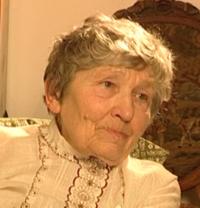“It is a very difficult issue to respect all the people.”

Stáhnout obrázek
Marta Marsinová was born on May 11, 1922, in Žilina. After finishing her studies at secondary grammar school in Žilina, she decided to continue in the study of Slovak language. She studied Slovak and German language together with general linguistics at the Faculty of Philosophy, at Comenius University in Bratislava. After the university she taught for three years at a grammar school in Banská Bystrica. From 1948 to 1950 she was working as an administrative official at the Language Department of Matica slovenská in Martin. Simultaneously she attended theological courses, she actively joined activities of Slovak catholic scouting and she organized summer girl camps along with a professor Mária Pecíková. Since in the 1950s the scientific departments of Matica slovenská were abolished, Marta Marsinová was moved into the Slovak Academy of Sciences (SAS) along with her colleagues. She became an acknowledged expert in the field of linguistics there. By the end of June in 1951 all the scientists were sent to be „re-educated“ by means of manufacturing. As a result, Marta Marsinová started to work in the company producing railroad ties. Later she was moved to Žilina and she worked in a company producing cloth for more than two years. Despite returning back to research of her beloved field of study - Slovak language in Ľudovít Štúr Institute of Linguistics in the Slovak Academy of Sciences, her delight in scientific work did not last for long, because on January 10, 1959, she was arrested by the State Security. She was sentenced to 18 months of imprisonment for attempts to subvert the ruling regime, distribution of religious literature, for religious activities in the Third Order of St. Francis as well as for anti-state statements. The Supreme Court in Prague later shortened her sentence to one year. After being released from the prison, she had to work for six months at production department of Figaro company in Bratislava. After the political thaw in 1968 she came back to Ľudovít Štúr Institute of Linguistics, where her love for Slovak language flourished. In 1973 she successfully defended her doctoral dissertation called „Slovesá z neslovesných základov“ (Verbs Derived from Non-Verbal Roots). After her retirement in 1980 she focused her energy on activities in ecumenical and women‘s movement in the Church.
